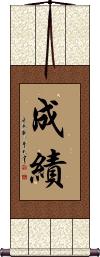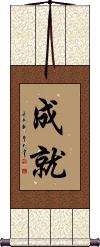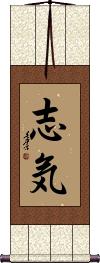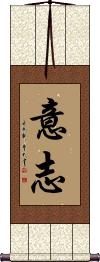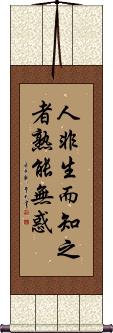Many custom options...
And formats...

Achievement in Chinese / Japanese...
Buy an Achievement calligraphy wall scroll here!
Personalize your custom “Achievement” project by clicking the button next to your favorite “Achievement” title below...
1. Achievement
2. Achievement / Accomplishment
3. Esprit de Corps / Determination
4. Determination to Achieve / Will-Power
6. Achieve Inner Peace; Find Deep Understanding
7. We are not born with knowledge, how does one achieve maturity?
Achievement
成績 is a Chinese, Japanese, and old Korean Hanja word that means achievement.
Depending on the context, it can also mean performance records, grades, or results.
Achievement / Accomplishment
成就 is the word most often used in Chinese, Korean and Japanese to mean accomplishment or achievement.
成就 can also be used to mean success, attain a result, fulfillment, realization, or completion.
Esprit de Corps / Determination
Determination to Achieve / Will-Power
意志 is a Chinese, Korean, and Japanese word that means “determination to achieve.” It can also be translated as: will; willpower; determination; volition; intention; or intent.
In Japanese, this can also be the given name, Ishi.
Determination to Achieve
一念発起 is a Japanese proverb, “Ichinen Hokki,” which suggests being resolved to do something or having a wholehearted intention to accomplish something.
Some will translate this as “the determination to accomplish something,” or “turning over a new leaf and being determined to find success.”
Achieve Inner Peace; Find Deep Understanding
寧靜而致遠 is five characters from a longer ten-character proverb composed by Zhuge Liang about 1800 years ago.
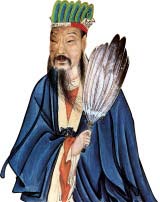
诸葛亮 Zhuge Liang
The proverb means “Your inner peace/tranquility/serenity will help you see or reach far (into the world).”
The last word means “far” but the deeper meaning is that you will surpass what you can currently see or understand. Perhaps even opening up vast knowledge and understanding of complex ideas.
We are not born with knowledge, how does one achieve maturity?
This figuratively means “Without a teacher, how can we learn/mature?”
人非生而知之者熟能無惑 is a philosophic pondering by Han Yu, a Tang Dynasty essayist, and philosopher (618-907 A.D.). This is a Chinese proverb that can be translated as “Knowledge is not innate to man, how can we overcome doubt?” or, “We are not born with knowledge, how does one achieve maturity?.”
This infers that we need the guidance of a teacher if we wish to learn, mature, and become better.
Not the results for Achievement that you were looking for?
Below are some entries from our dictionary that may match your Achievement search...
| Characters If shown, 2nd row is Simp. Chinese |
Pronunciation Romanization |
Simple Dictionary Definition |
成功 see styles |
chéng gōng cheng2 gong1 ch`eng kung cheng kung seikou / seko せいこう |
More info & calligraphy: Success(n,vs,vi) (1) success; achievement; (n,vs,vi) (2) succeeding (in life); (worldly) success; prosperity; (given name) Seikou |
成就 see styles |
chéng jiù cheng2 jiu4 ch`eng chiu cheng chiu jouju / joju じょうじゅ |
More info & calligraphy: Achievement / Accomplishment(n,n-suf,vs,vt,vi) fulfillment; fulfilment; realization; realisation; completion; (given name) Jōju siddhi: accomplishment, fulfillment, completion, to bring to perfection. |
成績 成绩 see styles |
chéng jì cheng2 ji4 ch`eng chi cheng chi seiseki / seseki せいせき |
More info & calligraphy: Achievementresults; record; grades; marks |
功 see styles |
gōng gong1 kung kou / ko こう |
meritorious deed or service; achievement; result; service; accomplishment; work (physics) (1) merit; success; meritorious deed; (2) achievement; accumulated experience; (male given name) Tsutomu Merit, meritorious; achievement, hence 功力 achieving strength, earnest effort after the good). |
跣 see styles |
xiǎn xian3 hsien sen せん |
barefooted (noun - becomes adjective with の) (1) barefoot; (suffix noun) (2) superior to (a professional, etc. in ability or achievement); (given name) Sen |
AT see styles |
ee tii; eetii(sk) / ee ti; eeti(sk) エー・ティー; エーティー(sk) |
(1) (See オートマチックトランスミッション) automatic transmission; AT; (2) (See アチーブメントテスト) achievement test; (3) alternative technology; (4) (See 適正技術) appropriate technology; (5) (See 聴能訓練士) auditory trainer |
三力 see styles |
sān lì san1 li4 san li sanriki |
The three powers, of which there are various groups: (1) (a) personal power; (6) tathāgata-power; (c) power of the Buddha-nature within. (2) (a) power of a wise eye to see the Buddha-medicine (for evil); (b) of diagnosis of the ailment; (c) of suiting and applying the medicine to the disease. (3) (a) the power of Buddha; (b) of samādhi; (c) of personal achievement or merit. |
三大 see styles |
sān dà san1 da4 san ta miou / mio みおう |
(prefix) (See 三大疾病) the big three ...; (surname) Miou The three great characteristics of the 眞如 in the 起信論 Awakening of Faith: (1) 體大 The greatness of the bhūtatathatā in its essence or substance; it is 衆生心之體性 the embodied nature of the mind of all the living, universal, immortal, immutable, eternal; (2) 相大 the greatness of its attributes or manifestations, perfect in wisdom and mercy, and every achievement; (3) 用大 the greatness of its functions and operations within and without, perfectly transforming all the living to good works and good karma now and hereafter. There are other groups, e.g. 體, 宗, and 用. |
事績 see styles |
jiseki じせき |
achievement; deed; exploit; merits |
事跡 事迹 see styles |
shì jì shi4 ji4 shih chi jiseki じせき |
deed; past achievement; important event of the past evidence; trace; vestige |
二空 see styles |
èr kōng er4 kong1 erh k`ung erh kung nikū |
The two voids, unrealities, or immaterialities; v. 空. There are several antitheses: (1) (a) 人空; 我空 The non-reality of the atman, the soul, the person; (6) 法空 the non-reality of things. (2) (a) 性空 The Tiantai division that nothing has a nature of its own; (b) 相空 therefore its form is unreal, i.e. forms are temporary names. (3) (a) 但空 Tiantai says the 藏 and 通 know only the 空; (b) 不但空 the 別 and 圓 have 空, 假, and 中 q.v. (4) (a) 如實空 The division of the 起信論 that the 眞如 is devoid of all impurity; (b) 如實不空 and full of all merit, or achievement. |
作為 作为 see styles |
zuò wéi zuo4 wei2 tso wei sakui さくい |
one's conduct; deed; activity; accomplishment; achievement; to act as; as (in the capacity of); qua; to view as; to look upon (something as); to take something to be (n,vs,vi) (1) artificiality; pretence; contrived act; (2) {law} (ant: 不作為) commission (of a crime); feasance |
偉勲 see styles |
ikun いくん |
great achievement |
偉業 伟业 see styles |
wěi yè wei3 ye4 wei yeh igyou / igyo いぎょう |
exploit; great undertaking great achievement; great feat; great work; great undertaking |
偉烈 see styles |
iretsu いれつ |
great achievement |
偉舉 伟举 see styles |
wěi jǔ wei3 ju3 wei chü |
great feat; splendid achievement |
働き see styles |
hataraki はたらき |
(1) work; labor; labour; (2) achievement; performance; ability; talent; (3) salary; income; earnings; (4) action; activity; workings; function; operation; movement; motion; (5) {ling} (also written as 活) conjugation; inflection |
先哲 see styles |
xiān zhé xian1 zhe2 hsien che sentetsu せんてつ |
the wise and learned individuals of the past ancient wise men 先達 One who has preceded (me) in understanding, or achievement. |
先進 先进 see styles |
xiān jìn xian1 jin4 hsien chin senshin せんしん |
sophisticated; advanced (technology etc); meritorious; exemplary (deeds etc) (adj-no,n) (1) advanced; developed; (2) (ant: 後進・1) seniority; senior; superior; elder 先輩 Of earlier, or senior rank or achievement. |
初果 see styles |
chū guǒ chu1 guo3 ch`u kuo chu kuo motoka もとか |
(female given name) Motoka The initial fruit, or achievement, the stage of srota-āpanna, illusion being discarded and the stream of enlightenment entered. |
功勛 功勋 see styles |
gōng xūn gong1 xun1 kung hsün |
achievement; meritorious deed; contributions (for the good of society) |
功勳 功勋 see styles |
gōng xūn gong1 xun1 kung hsün kōkun |
meritorious service; distinguished contribution; achievement of great merit merits of effort |
功名 see styles |
gōng míng gong1 ming2 kung ming koumyou(p); koumei / komyo(p); kome こうみょう(P); こうめい |
scholarly honor (in imperial exams); rank; achievement; fame; glory great achievement; glorious deed; (gaining) fame; (earning) distinction; (female given name) Isana |
功德 see styles |
gōng dé gong1 de2 kung te kudoku |
achievements and virtue Virtue achieved; achievement; power to do meritorious works; merit; meritorious virtue; the reward of virtue; a name for 弗若多羅 Puṇyatara, one of the twenty-four 天尊 deva aryas, worshipped in China. |
功業 功业 see styles |
gōng yè gong1 ye4 kung yeh kougyou / kogyo こうぎょう |
achievement; outstanding work; glorious deed exploit; achievement |
功烈 see styles |
gōng liè gong1 lie4 kung lieh |
achievement |
功用 see styles |
gōng yòng gong1 yong4 kung yung kouyou / koyo こうよう |
function (obsolete) use; function; role Action, functioning, in practice and achievement. |
功績 功绩 see styles |
gōng jì gong1 ji4 kung chi kouseki / koseki こうせき |
feat; contribution; merits and achievements achievement; meritorious deed; distinguished service; contribution |
勇飛 see styles |
yuuhi / yuhi ゆうひ |
flying jump; great achievement; (female given name) Yūhi |
勛業 勋业 see styles |
xūn yè xun1 ye4 hsün yeh |
meritorious achievement |
Click here for more Achievement results from our dictionary
The following table may be helpful for those studying Chinese or Japanese...
| Title | Characters | Romaji (Romanized Japanese) | Various forms of Romanized Chinese | |
| Achievement | 成績 成绩 | seiseki | chéng jì / cheng2 ji4 / cheng ji / chengji | ch`eng chi / chengchi / cheng chi |
| Achievement Accomplishment | 成就 | jouju / joju | chéng jiù cheng2 jiu4 cheng jiu chengjiu | ch`eng chiu chengchiu cheng chiu |
| Esprit de Corps Determination | 志気 | shi ki / shi ge shiki / shige | ||
| Determination to Achieve Will-Power | 意志 | ishi | yì zhì / yi4 zhi4 / yi zhi / yizhi | i chih / ichih |
| Determination to Achieve | 一念発起 | ichi nen ho kki ichinenhokki ichi nen ho ki | ||
| Achieve Inner Peace; Find Deep Understanding | 寧靜而致遠 宁静而致远 | níng jìng ér zhì yuǎn ning2 jing4 er2 zhi4 yuan3 ning jing er zhi yuan ningjingerzhiyuan | ning ching erh chih yüan ningchingerhchihyüan |
|
| We are not born with knowledge, how does one achieve maturity? | 人非生而知之者熟能無惑 | rén fēi shēng ér zhī zhī zhě shú néng wú huò ren2 fei1 sheng1 er2 zhi1 zhi1 zhe3 shu2 neng2 wu2 huo4 ren fei sheng er zhi zhi zhe shu neng wu huo | jen fei sheng erh chih chih che shu neng wu huo | |
| In some entries above you will see that characters have different versions above and below a line. In these cases, the characters above the line are Traditional Chinese, while the ones below are Simplified Chinese. | ||||
Successful Chinese Character and Japanese Kanji calligraphy searches within the last few hours...
